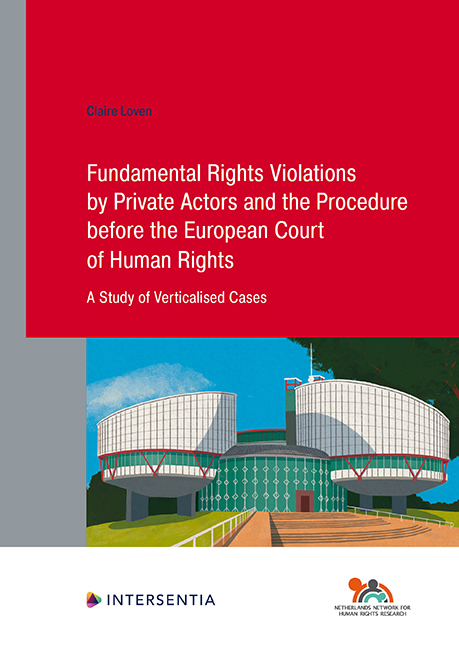 Fundamental Rights Violations by Private Actors and the Procedure before the European Court of Human Rights
Fundamental Rights Violations by Private Actors and the Procedure before the European Court of Human Rights Published online by Cambridge University Press: 29 February 2024
INTRODUCTION
In developing the introduction to the Convention system further, this chapter discusses two guiding Convention principles: the principle of effectiveness (Section 2) and the principle of subsidiarity (Section 3), which play an important role in the interpretation and application of the Convention and the functioning of the Convention system as a whole. This is further explained below by providing a general background to the effectiveness and subsidiarity principle and discussing different manifestations of these principles, including the no fourth-instance court doctrine, the margin of appreciation doctrine, and procedural review.
PRINCIPLE OF EFFECTIVENESS
In the Belgian Linguistic case of 1968 the Court held that the general aim of the Convention is ‘to provide effective protection of fundamental rights’.1 Eleven years later, in Airey, the Court articulated the principle of effectiveness for the first time, holding that ‘the Convention is intended to guarantee not rights that are theoretical or illusory but rights that are practical and effective’. Ever since, the Court has used this formula in its judgments. In Scoppola (No. 2) the Court even held that ‘[i]t is of crucial importance that the Convention is interpreted and applied in a manner which renders its rights practical and effective’.
Thus, the effectiveness principle plays an important role in guiding the interpretation and application of the Convention. In practice, this has resulted in a broad interpretation of Convention rights and a narrow interpretation of their exceptions and restrictions. The ‘living instrument doctrine’, which finds its basis in the effectiveness principle, plays an important role in this regard. This doctrine entails that the Court interprets the Convention ‘in the light of present-day conditions’ and enables it to keep up with changing (technological or social) conditions in the Convention States. As such, it is a tool for the Court to provide effective protection of Convention rights. By applying the living instrument doctrine, the Court has, for example, extended the scope of Article 4 ECHR to human trafficking and the scope of Article 8 ECHR to gender identity and environmental issues. In addition to being a basis for a broad interpretation of Convention rights, the principle of effectiveness has been an important foundation for the development and recognition of positive obligations for States to protect Convention rights. This is further explained in Part II (Chapter 5), in which the concept of (horizontal) positive obligations is discussed in detail.
To save this book to your Kindle, first ensure [email protected] is added to your Approved Personal Document E-mail List under your Personal Document Settings on the Manage Your Content and Devices page of your Amazon account. Then enter the ‘name’ part of your Kindle email address below. Find out more about saving to your Kindle.
Note you can select to save to either the @free.kindle.com or @kindle.com variations. ‘@free.kindle.com’ emails are free but can only be saved to your device when it is connected to wi-fi. ‘@kindle.com’ emails can be delivered even when you are not connected to wi-fi, but note that service fees apply.
Find out more about the Kindle Personal Document Service.
To save content items to your account, please confirm that you agree to abide by our usage policies. If this is the first time you use this feature, you will be asked to authorise Cambridge Core to connect with your account. Find out more about saving content to Dropbox.
To save content items to your account, please confirm that you agree to abide by our usage policies. If this is the first time you use this feature, you will be asked to authorise Cambridge Core to connect with your account. Find out more about saving content to Google Drive.